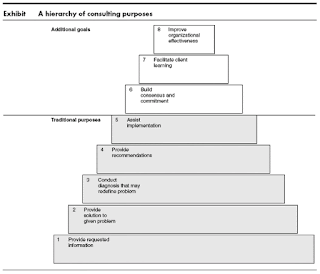Each year management consultants in the United States receive more than $2 billion for their services.1 Much of this money pays for impractical data and poorly implemented recommendations.2
To reduce this waste, clients need a better understanding of what
consulting assignments can accomplish. They need to ask more from such
advisers, who in turn must learn to satisfy expanded expectations.
This article grows out of current research on effective consulting,
including interviews with partners and officers of five well-known
firms. It also stems from my experience supervising beginning
consultants and from the many conversations and associations I’ve had
with consultants and clients in the United States and abroad. These
experiences lead me to propose a means of clarifying the purposes of
management consulting. When clarity about purpose exists, both parties
are more likely to handle the engagement process satisfactorily.
A Hierarchy of Purposes
Management consulting includes a broad range of activities, and the
many firms and their members often define these practices quite
differently. One way to categorize the activities is in terms of the
professional’s area of expertise (such as competitive analysis,
corporate strategy, operations management, or human resources). But in
practice, as many differences exist within these categories as between
them.
Another approach is to view the process as a sequence of
phases—entry, contracting, diagnosis, data collection, feedback,
implementation, and so on. However, these phases are usually less
discrete than most consultants admit.
Perhaps a more useful way of analyzing the process is to consider its
purposes; clarity about goals certainly influences an engagement’s
success. Here are consulting’s eight fundamental objectives, arranged
hierarchically (also see the Exhibit):
Exhibit A hierarchy of consulting purposes
1. Providing information to a client.
2. Solving a client’s problems.
3. Making a diagnosis, which may necessitate redefinition of the problem.
4. Making recommendations based on the diagnosis.
5. Assisting with implementation of recommended solutions.
6. Building a consensus and commitment around corrective action.
7. Facilitating client learning—that is, teaching clients how to resolve similar problems in the future.
8. Permanently improving organizational effectiveness.
Read full here: https://hbr.org/1982/09/consulting-is-more-than-giving-advice
 When Microsoft first announced HoloLens, its mixed-reality hardware platform, many of us assumed it was little more than a cool demo that was meant to stir up excitement for the company. But it was clearly more than that and starting today, Microsoft will start taking pre-orders from developers who have applied for a unit. Developers who get an invite will be able to buy a unit for $3,000.… Read More
When Microsoft first announced HoloLens, its mixed-reality hardware platform, many of us assumed it was little more than a cool demo that was meant to stir up excitement for the company. But it was clearly more than that and starting today, Microsoft will start taking pre-orders from developers who have applied for a unit. Developers who get an invite will be able to buy a unit for $3,000.… Read More Amazon has signed a wholesale supply deal with Morrisons, one of Britain’s largest supermarket chains, to deliver fresh and frozen groceries to Amazon Prime Now and Amazon Pantry customers.
Amazon has signed a wholesale supply deal with Morrisons, one of Britain’s largest supermarket chains, to deliver fresh and frozen groceries to Amazon Prime Now and Amazon Pantry customers.  Last fall, Mr. Nadella came to Washington and in a comprehensive speech the Microsoft CEO laid out Microsoft’s broad vision for security in the enterprise. Today, the company made a series of announcements in a lengthy blog post from Microsoft Chief Information Security Officer Brett Arsenault that starts to bring that vision into clearer focus. It’s probably not a…
Last fall, Mr. Nadella came to Washington and in a comprehensive speech the Microsoft CEO laid out Microsoft’s broad vision for security in the enterprise. Today, the company made a series of announcements in a lengthy blog post from Microsoft Chief Information Security Officer Brett Arsenault that starts to bring that vision into clearer focus. It’s probably not a… 

